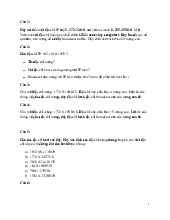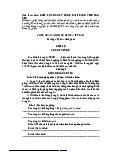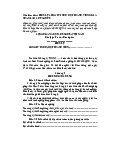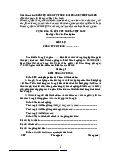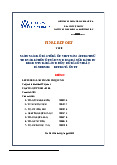




Preview text:
Questions and Answers
Section 1, 2, & 3 Question:
When WIPO is notified of the merger of the basic applications or registrations by an Office of
origin, what information must that notification contain? Answer:
A notification of the merger of the basic applications or registrations from the Office of origin must contain:
The number of the international registration. Where this is not yet available, the number
of the basic application should be provided.
The name of the holder or applicant.
The number of the basic application or registration resulting from the merger. Question:
The basic mark has been abandoned by its owner. The international registration based on that
basic mark is six years old. Is the Office of origin required to inform WIPO about the ceasing of effect of the basic mark? Please explain your answer. Answer:
The Office of origin is required to inform WIPO about the ceasing of effect of the basic mark,
which took place during the five-year dependency period.
This rule of ceasing of effect also applies to basic marks affected after the expiry of the five
years of dependency, where the action resulted in the ceasing of effect commenced within that period.
Therefore, the Office of origin should check when the basic mark was abandoned. If this action
took place before the end of the five-year dependency period, the Office of origin has to notify
WIPO about this fact and ask to cancel the international registration concerned to the extent
applicable. In case the basic mark was abandoned outside the dependency period, the Office of
origin is not required to inform WIPO of the ceasing of effect of the basic mark. Question:
A ceasing of effect of the basic mark can be the result of varied actions or decisions, for
example, a final decision of rejection of a basic application or the limitation of goods and
services in a basic application or basic registration.
Are there any reasons where, during the five-year dependency period, a ceasing of effect of the
basic mark does not need to be notified to WIPO where the scope of protection affects the international registration? Answer:
No, dependence of the international registration on the basic mark is absolute and is effective
regardless of the reasons why the basic mark has ceased to enjoy, in whole or in part, legal protection. Question:
An international registration has been cancelled due to the ceasing of effect of the basic mark. Is
there a process where the holder has the possibility of requesting that their international right
become national or regional rights directly before the designated Contracting Parties
concerned? If so, what is that process? Answer:
Yes, the process is called transformation of the international registration.
A national or regional application must be filed directly to the IP Office of the designated
Contracting Party concerned within three months from the date of the recording of the
cancellation of the international registration in the International Register.
The national or regional applications resulting from transformation are treated as if they had
been filed on the date of the original international registration or the date of the subsequent designation, if applicable.
The transformation is not available to the holders having requested the voluntary cancellation
of the international registration. Section 4 Question:
An error can be corrected ex officio when discovered by WIPO, or on the request of the holder
or a national or regional IP Office. List the types of errors that a correction in the International
Register will be generally made for. Answer:
A correction in the International Register will be generally made for the following errors:
Discrepancy between the data in the International Register and the documents filed with WIPO; Obvious errors;
Objective errors in facts recorded in the International Register;
Substantive errors attributed to a national or regional IP Office. Question:
What types of errors will not be corrected by WIPO when resulting from a mistake made by the holder or representative? Answer:
WIPO will not correct the mistakes made by the holder or representative. In particular, WIPO will not correct:
Errors concerning the list of designated Contracting Parties, or
Errors concerning the list of goods and services. Question:
If an error is attributable to an Office and its correction would affect the rights deriving from the
international registration, is there a time limit for the Office to request the correction? Answer:
Yes, the error may only be corrected if the request for correction is received by WIPO within
nine months from the date of the publication of the incorrect entry in the International Register. Scenario Answers
Ceasing of Effect of the Basic Mark (1)
Yes, the Office of origin has to notify WIPO of a partial ceasing of effect of the basic mark.
Removal of class 14 from the basic mark affects the scope of protection of the international
registration. As this change has occurred within the five-year dependency period, the Office of
origin has to notify WIPO and request a partial cancellation of the international registration (i.e.,
class 14 must be deleted from the international registration).
At the same time, the Office would not need to notify WIPO of the changes in class 9 and class
16 because they concern the goods that are not included in the list of goods and services in the
international registration. Those changes do not therefore affect the scope of protection of the international registration.
Ceasing of Effect of the Basic Mark (2)
No, the Office of origin does not need to notify WIPO of a partial ceasing of effect of the basic
mark because the change in the list of goods and services has occurred outside the five-year dependency period.
Only changes that occur within five-year period or as a result of an action that commenced
within this dependency period have to be notified to WIPO.
Ceasing of Effect of the Basic Mark (3)
Yes, the Office of origin has to notify WIPO of a partial ceasing of effect of the basic mark.
Any changes in the basic mark affecting the scope of protection of the international registration,
that occur within the five-year dependency period or as a result of an action that commenced
within the five-year dependency period must be notified to WIPO.
The amendments to class 18 and class 25 of the basic mark affect the scope of protection of the
international registration. Even though the amendments are made outside the five-year
dependency period, they are a result of an action that commenced within the five-year
dependency period. Therefore, the Office of origin has to notify WIPO and request a partial
cancellation of the international registration (i.e., class 18 and class 25 will be amended to
match the list of goods in the basic mark).
At the same time, the changes made to class 35 of the basic mark do not need to be notified to
WIPO because they were not part of the international registration concerned. Correction (1)
WIPO will only action the request for correction from the Office of origin. It will not action the
correction request from the representative.
A substantive error that is attributable to an Office that affects the rights deriving from an
international registration will be corrected as long as the request is received by WIPO within nine months.
However, an error that can be attributed to the applicant, holder or their representative will not
be considered by WIPO as an error in the International Register, and will not be corrected. Correction (2)
No, WIPO is unable to take corrective action in relation to the request it has received.
If a correction effects the rights derived from the international registration, the request must be
submitted to WIPO by the Office of origin within nine months from the date of the publication
of the incorrect entry in the International Register.
In this instance, the request for correction is outside of this nine months period and cannot be processed.
